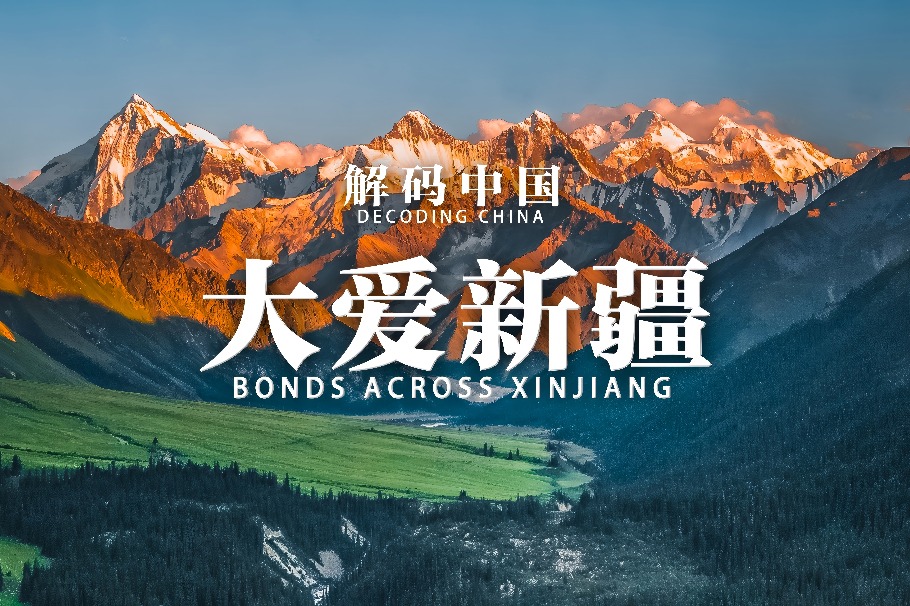Nature's healing


China offers some best practices that can help us make Mother Earth beautiful again
The COVID-19 pandemic has shown us that nature bounces back fast when we humans stop overwhelming it. Penguins have been observed in the streets of Cape Town, bears in Barcelona and deer in Japanese cities. Wildlife have been having parties in the United States' national parks.
But there is much to be done if we are to restore the world's ecosystems. China has a lot to offer in this regard as now, more often than not, global best practice originates in China.
Here are four ways in which China may offer inspiration and leadership.
First, policy should be people-centered. In China, reports say that Inner Mongolia has raised the vegetation coverage for its grasslands to 45 percent, the highest since the 1990s. That came from the hard and smart collective efforts made by numerous people. Among them were those who transformed the Kubuqi Desert from a "sea of death "to a dazzling oasis, and those who turned the Saihanba region in Hebei province from a barren land to a "beautiful highland".
There are initiatives from elsewhere that offer the same lesson. In the mid-2000s a wave of poaching hit Zakouma National Park in Chad. Thousands of elephants were killed by armed poachers that would fire indiscriminately into densely packed elephant herds, killing entire family units.
Zakouma employed over 100 rangers from local communities and gave them extensive training. A comprehensive anti-poaching program that put people at the center, equipped with modern-day technology and tactics, finally brought the elephant poaching under control.
Likewise, Rwanda has succeeded in increasing the number of gorillas by making local people the frontline of protection. A visit to see the gorillas costs nearly 10,000 yuan ($1,564) for one person to spend one hour with the apes. It's expensive, but it creates a huge incentive for the locals. Thousands of people are employed as hotel staff, taxi drivers and tourist guides.
When I worked as minister of environment and international development in Norway, I spent long hours negotiating new national parks with the people living around them. Every hour was well spent as changes proposed by local people, gave them the will to protect nature.
Second, a new people-friendly narrative is needed. It may seem a platitude to say that the purpose of human language is to communicate. But it is not uncommon to find our speeches and documents full of technical jargon only intelligible to an erudite few.
Laurent Fabius, the French foreign minister who fathered the Paris climate accord once jokingly asked me: "What is biodiversity? Is that a disease?" He had a point. Bureaucratese is the obstacle standing in the way of mobilizing good people to protect our incredible nature.
To win the battle to protect nature, we need to mobilize people through their love of nature. The slogan "Beautiful China" is a brilliant emotional attempt in this regard. US President Joe Biden recently copied it, speaking about a beautiful America. That shows how much the idea resonates and that we are moving in the right direction.
Third, many of the threats that our ecosystems face today are transnational and cross-border, making international cooperation critical. China is committed to concerted efforts to address common challenges and promote collaborative efforts.
And since China has incomparable influence in shaping today's industries, it can play a key role in raising awareness of the need to make sure the supplies of timber, palm oil, soybean or beef come from responsible sources that do not put land, water and forests in jeopardy. Other countries will add their weight. Indonesia has been very successful recently in reducing deforestation through efforts from a visionary government and determined business.
Ivory used to be a lucrative business in China before the government imposed a stringent sales ban on it. China's efforts to enforce the ban on sales of ivory have made a huge difference to elephant poaching in Africa.
Fourth, conservation needs to be taken to urban areas.
It's a big challenge to protect nature inside cities or in heavily populated areas such as the lower Yangtze River Delta or Pearl River Delta. But China is developing the necessary tools. The Ecological Conservation Red Line policy has been formulated with the aim of protecting areas all over China based on a scientific assessment of ecosystem value. This is best international practice. It will guide conservation in the most urban and most populated parts of China. The Kunming conference presents an opportunity to familiarize the world with the concept and inspire others.
A lot is happening in China. The city planners of Shenzhen, a tech city in South China, have introduced green corridors through the city and protected a wetland inside the town. The wetland allows birds from the southern hemisphere to rest en-route to the Arctic.
The fishing ban in the Yangtze River is another visionary decision. It will be tough for many people in the short run, but it will ensure that the river's ecosystems are restored and that fish return in abundance.
During a visit to Anji county in Zhejiang province, President Xi Jinping, who was the Party chief of Zhejiang at that time, said: "We do not promote economic development at the expense of the environment. Clear waters and green mountains are as valuable as mountains of gold and silver."
Today, over 97 percent of villages in Zhejiang have transformed their polluted waterways into clean and drinkable rivers, benefiting 30 million residents. They were awarded the United Nation's Champion of the Earth prize in 2018.
It is a cliché to say that human livelihoods depend on Mother Earth, but not so when we find ourselves no longer welcome in her arms. The 20th century development model was first we pollute, and then we clean up. We sacrificed the natural world for economic development. Now it's time to stop the damage we are doing to our common home and restore the harmony between man and nature. Let's shape a beautiful China in a beautiful world.
The author is the president of the Belt and Road Initiative Green Development Institute and former executive director of the United Nation Environment Programme. The author contributed this article to China Watch, a think tank powered by China Daily.
The views do not necessarily reflect those of China Daily.
Today's Top News
- Xi stresses building socialist modern Xinjiang
- Xi visits exhibition marking 70th founding anniv. of Xinjiang Uygur autonomous region
- Shenzhou XX crew to conduct fourth spacewalk in coming days
- US, EU leaders air divisions
- Visit by US lawmakers expands dialogue
- Prosecutors eye tech edge to combat financial crimes






























